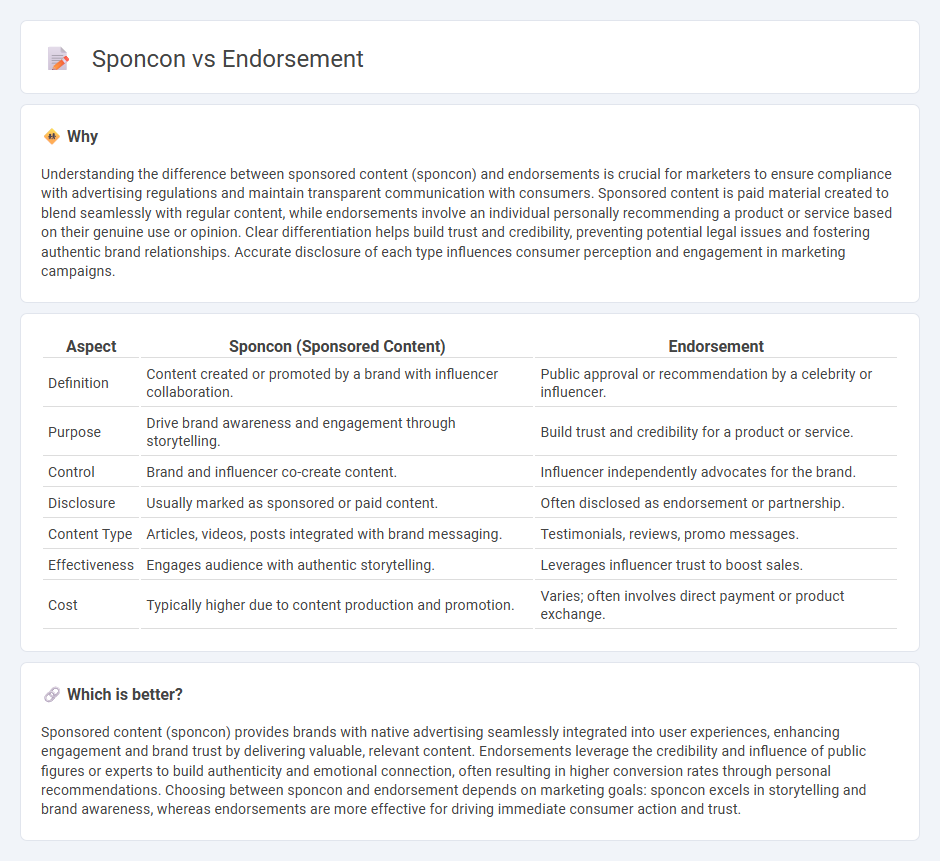
Sponsored content seamlessly integrates branded messages into editorial contexts, enhancing audience engagement without overt advertising. Endorsements rely on influencers or celebrities who publicly support a product, leveraging their credibility and reach to boost consumer trust and sales. Explore the nuances between these marketing strategies to optimize your campaign impact.
Why it is important
Understanding the difference between sponsored content (sponcon) and endorsements is crucial for marketers to ensure compliance with advertising regulations and maintain transparent communication with consumers. Sponsored content is paid material created to blend seamlessly with regular content, while endorsements involve an individual personally recommending a product or service based on their genuine use or opinion. Clear differentiation helps build trust and credibility, preventing potential legal issues and fostering authentic brand relationships. Accurate disclosure of each type influences consumer perception and engagement in marketing campaigns.
Comparison Table
| Aspect | Sponcon (Sponsored Content) | Endorsement |
|---|---|---|
| Definition | Content created or promoted by a brand with influencer collaboration. | Public approval or recommendation by a celebrity or influencer. |
| Purpose | Drive brand awareness and engagement through storytelling. | Build trust and credibility for a product or service. |
| Control | Brand and influencer co-create content. | Influencer independently advocates for the brand. |
| Disclosure | Usually marked as sponsored or paid content. | Often disclosed as endorsement or partnership. |
| Content Type | Articles, videos, posts integrated with brand messaging. | Testimonials, reviews, promo messages. |
| Effectiveness | Engages audience with authentic storytelling. | Leverages influencer trust to boost sales. |
| Cost | Typically higher due to content production and promotion. | Varies; often involves direct payment or product exchange. |
Which is better?
Sponsored content (sponcon) provides brands with native advertising seamlessly integrated into user experiences, enhancing engagement and brand trust by delivering valuable, relevant content. Endorsements leverage the credibility and influence of public figures or experts to build authenticity and emotional connection, often resulting in higher conversion rates through personal recommendations. Choosing between sponcon and endorsement depends on marketing goals: sponcon excels in storytelling and brand awareness, whereas endorsements are more effective for driving immediate consumer action and trust.
Connection
Sponsored content (sponcon) and endorsements both serve as influential marketing tools where brands collaborate with content creators to promote products or services. Sponcon integrates brand messages seamlessly into authentic content, enhancing audience trust, while endorsements rely on a creator's personal recommendation to boost brand credibility and consumer engagement. Together, these strategies leverage influencer authority and targeted visibility to drive brand awareness and sales conversion.
Key Terms
Influencer
Endorsement involves influencers publicly supporting a product based on genuine use and personal approval, while sponsored content (sponcon) typically entails a commercial agreement where influencers create content promoting a brand for compensation. Authenticity and transparency are critical in influencer marketing to maintain audience trust and comply with advertising regulations. Explore detailed strategies to effectively balance endorsement and sponcon in your influencer campaigns.
Authenticity
Endorsements emphasize genuine approval and personal trust, enhancing the perceived authenticity of a product or service. Sponsored content (sponcon) often blends promotional messages seamlessly into regular content, which can sometimes dilute authenticity if not clearly disclosed. Discover how maintaining transparent communication can strengthen authenticity in marketing strategies.
Brand Partnership
Endorsement involves a celebrity or influencer explicitly promoting a brand or product, often reflecting their genuine approval, while sponcon (sponsored content) is branded content paid for by a company that may or may not include direct personal endorsement. Brand partnerships thrive on authentic endorsement to build trust and loyalty, whereas sponcon leverages targeted advertising strategies to reach specific audiences. Explore the nuances of brand partnerships to optimize your marketing approach.
Source and External Links
endorsement | Wex | US Law | LII / Legal Information Institute - An endorsement is the writing of one's name on the back of an instrument as an authentication or transfer of an interest, commonly seen on negotiable instruments like checks.
Endorsement - The term endorsement can refer to a testimonial promoting a product, a political support statement, a signature on a negotiable instrument, or a form added to an insurance policy to modify its terms.
Advertisement Endorsements | Federal Trade Commission - Endorsements used in advertising must be truthful and not misleading, with disclosure required if there is a connection between the endorser and the marketer, ensuring consumers are not deceived.
 dowidth.com
dowidth.com